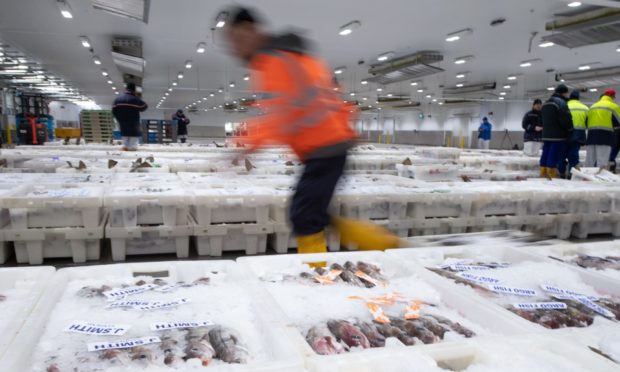Scottish fish producers have called for post-Brexit plans for exports to be implemented now to help supplies reach customers in mainland Europe in time for Christmas – as confusion remains over vital testing required to get product moving again.
The UK Government has already drawn up plans for perishable goods like fish and other seafood to be given priority treatment for Channel crossings after Britain fully exits the EU on December 31.
But to the anger of trade groups, their seafood – worth millions of pounds – is not being expedited now, despite being stranded at the side of the road on approach to Dover since Sunday.
More than 5,000 HGVs – some carrying up to £250,000 of Scottish seafood – were being held nearby yesterday, as anger boiled over into clashes between drivers and police.
Last night, lorries finally left a Kent airfield where they had been holed up for four days.
The Scottish Salmon Producers Organisation (SSPO) said it welcomed a French decision to re-open routes for freight, which came with a requirement for lorry drivers to carry a negative test result for Covid-19.
But the trade body also urged the UK and French governments to immediately prioritise the movement of perishable goods, particularly fish and seafood from Scotland, which has a limited shelf life.
Salmon is the UK’s biggest food export and the week leading up to Christmas is the busiest time of the year for cross-Channel deliveries.
SSPO chief executive Tavish Scott said: “The UK Government has, rightly, got a clear plan to prioritise perishable seafood products for the Channel crossing in the event of queues forming after Brexit comes into force at the end of this year.
“We need to have those plans put into operation now. Our producers have lost millions of pounds since the border was closed on Sunday night.
“They need urgent action to be taken now to prevent this crisis turning into a disaster.”
The closure of UK borders due to a new strain of the coronavirus has caused major problems for Scotland’s salmon producers, stranding trucks full of fish in Kent and preventing others from even setting off from Scotland.
Some lorries have had to turn back, while a number of companies have had to cancel their harvesting plans – leaving European customers without fish they were expecting.
Tuesday night’s decision by the French authorities cleared the way for road freight deliveries to resume but a huge backlog on the UK side of the Channel means it will be some considerable time before operations return to normal.
Trade bodies have warned the loss of Christmas trade, after a year blighted by coronavirus, could prove a “fatal blow” for small firms.
Chief executive of the Scottish Seafood Association, Jimmy Buchan, also complained about fish shipments being left to ruin at the roadside amid a “free for all” to get tested among lorry drivers.
He also hit out at the lack of information, adding: “There is chaos now because no one knows where you get tested – can you do it prior to leaving the country, in your local area? Who certifies it? What paperwork is needed?
“This is the biggest mess I’ve ever seen with the government issuing rules on the hoof, with no one accountable to give the answers we need – it’s atrocious.
“Boris Johnson needs to delegate a minister to take control, I can’t get through to the transport, food and Scottish secretaries and everyone is in disarray.”
All truck drivers, regardless of nationality, are required to take a lateral flow test which can detect the new strain and return results in about 30 minutes.
First Minister Nicola Sturgeon has offered her government’s help in testing drivers before they leave Scotland in an effort to salvage New Year trade – but it is not clear whether this fits with the deal struck with French authorities.
Yesterday, Transport Secretary Grant Shapps confirmed there continued to be “severe delays” at the port and urged people to avoid Kent until the backlog cleared.
